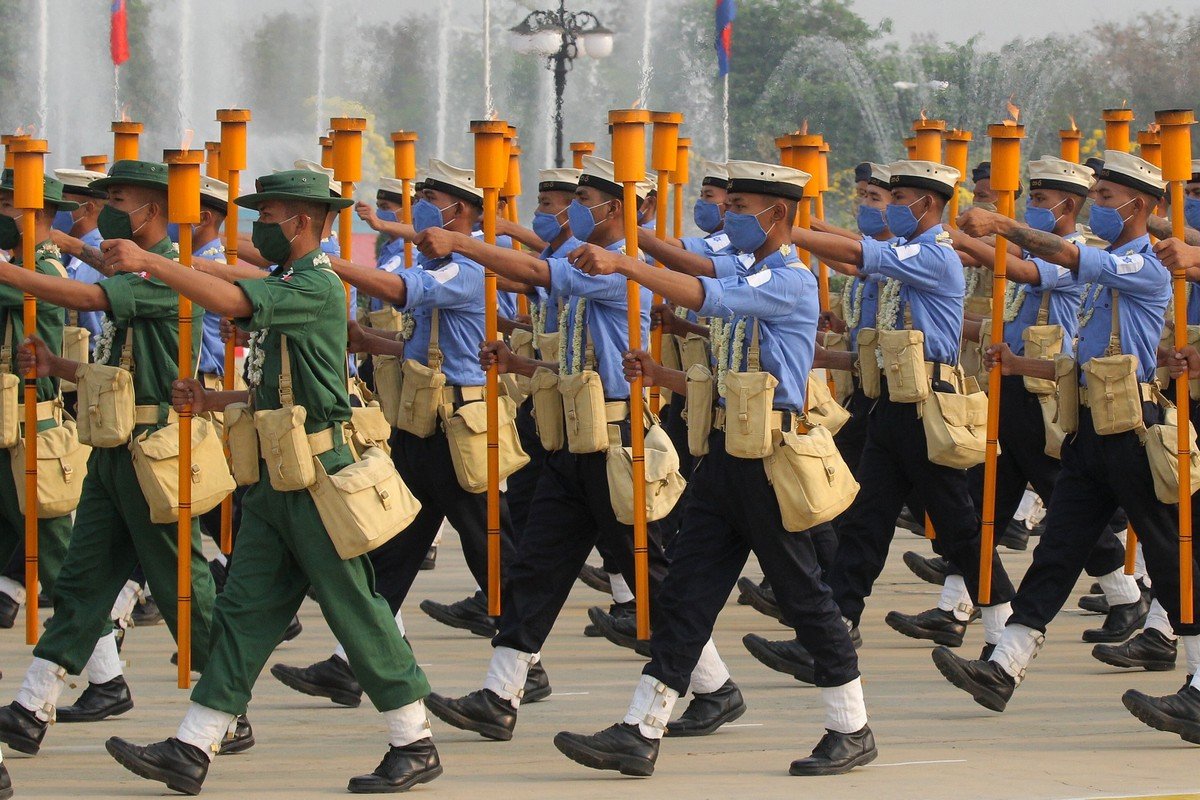"An Army with a Heart of Darkness"
Photo Caption and Credit: The Tatmadaw marching during the 2021 Resistance Day parade (Wikipedia).
In "The Revolution Will Not Be Televised," we covered the early 2021 military coup in Myanmar (also called Burma). On February 1, the Tatmadaw (the official name of the military) seized control of the country, detained civilian leaders, and disrupted access to communications to silence their people and limit the press. The military has since mounted a campaign of persistent violence. Can the international community work together to stop the Tatmadaw?
The British colonial period. For more than seventy years, the Tatmadaw has been engaged in violent conflicts in Myanmar. David Scott Mathieson, a military analyst, described them to The New York Times as “an army with a heart of darkness.” To understand their origins, start with the British colonial period in Myanmar (1885-1948). Colonists upended the country's social hierarchy and Buddhist religious systems, reducing ethnic Burmans' considerable power and authority. For oppressed ethnic minorities, the colonial era brought the promise of upward mobility. At the same time though, the British brought Muslim Indians into the country for additional labor, pitting this new labor force against entrenched workers. Vying for previously-held economic power, nationalism took root and factions formed between Burmans and non-Burmans and between Buddhists and non-Buddhists.
The Thirty Comrades' blood oath. Having been previously forbidden from joining the British forces, ethnic Burmans welcomed the Japanese invasion during World War II, from 1942 to 1945. They eventually changed course and joined the Allies, but during this timeframe tensions grew between the ethnic minorities who sided with the British from the start of the war and Burmans who had chosen the Japanese. In 1941, before the Japanese entered Myanmar, their troops secretly trained a fiercely devoted group of young men known as the Thirty Comrades. Bound by a blood oath, they formed an army and successfully fought for freedom from the British in 1948. For a brief moment, Myanmar came close to achieving peace. But that army grew into the Tatmadaw and in 1962 they rose to political power during a military coup, a violent act they would repeat again and again, in the name of unity, to maintain control and suppress ethnic minorities.
Flash forward to today's conflict. On Thursday, Human Rights Watch (HRW) released their findings on the bloody March 14 protest against the February military coup. In videos shared on social media, HRW said security officials could be heard discussing their weapons of choice to gravely harm and/or kill protestors. One officer said, “I will show no mercy for these people.” In the months since, the military junta has displayed unrelenting cruelty, indiscriminately killing civilians, burning villages, and stealing resources. In ethnic minority regions, they have been accused of using women as human shields as they march through hostile territories. This is not an uncommon practice. In 2020, the military forced civilians to walk across landmines to detonate them.
Global pressure can help end the military's foreign funding and support. Justice for Myanmar has been calling for the international community to stop supporting Myanmar's military. While the United Nations denied a seat for the military junta on December 1, and some governments have released statements condemning human rights abuses, private corporations are still funding the military, some perhaps unknowingly. Here are two examples and ways we can help:
Avoid buying gems from Myanmar - In late November, Justice for Myanmar found that U.S. retailers are still selling jewelry with rubies and jade from Myanmar. The gem trade funds the military. Share this information with friends and family to curtail these buying practices.
Ask your bank to stop investing in the Tatmadaw - In July, Justice for Myanmar uncovered 19 international banks that have ties to Myanmar's military. Is your bank on their list of direct or indirect investors? If so, take a look at Human Rights Watch's October letter to learn more about how banks are involved and what you can ask your bank to do.



